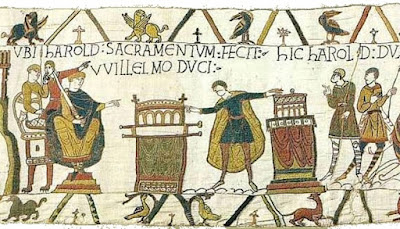The early sections of Carolus et Maria focus on the first and second conjugation verbs. They do, however, gently introduce the other conjugations i.e. the 3rd, 3rd-iō and 4th conjugations. Many examples of the 3rd conjugation are given since it is the most commonly found of these three conjugations, and far more information is given in the links. As with the noun declensions, don’t try to learn everything at once. First of all note:
(1) The personal
endings i.e. who is performing the action is always clear, and
applies to all conjugations of the verbs.
-ō: I
-s: you (singular)
-t: he / she / it
-mus: we
-tis: you (plural)
-nt: they
(2) the verbs are
classified into different conjugations based upon their stem i.e. the
vowel to which the ending is added
[1] 3rd
conjugation
Fābulās tuās in
epistulīs tuīs semper legō │ I always read your stories
in your letters
Bene scrībis
│ You write well
Helena iānuam
claudit │ Helena closes the door
Magistra hās
epistulās in scholā legit │ The teacher reads these letters in
school
Pater intellegit
│ The father understands
Iūliae dōnum
ostendit │ He shows the gift to Julia
Nōn legit │
He does not read / He isn’t
reading
Fābulās legimus
│We read stories
Intellegitisne,
discipulī? │ Do you understand, pupils?
Discipulī linguam Latīnam
discunt │ The pupils are learning Latin
Magistrae dōnum et
epistulam puer et puella ostendunt │ The boy and the girl show the
letter and the gift to the teacher
LINKS: 3rd
conjugation
11.03.24:
introduction to 3rd conjugation verbs ... and how to be a worthless dice
player!
https://adckl.blogspot.com/2024/04/110324-introduction-to-3rd-conjugation.html
11.03.24: 3rd
conjugation verbs: ways of learning [1]
https://adckl.blogspot.com/2024/04/110324-3rd-conjugation-verbs-ways-of.html
11.03.24: simple
practice for the 3rd conjugation
https://adckl.blogspot.com/2024/04/110324-simple-practice-for-3rd.html
11.03.24: ways of
learning [2]
https://adckl.blogspot.com/2024/04/110324-ways-of-learning.html
24.10.24: Level 1;
review; practice in the verbs [8]; 3rd conjugation
https://adckl.blogspot.com/2024/09/241024-level-1-review-practice-in-verbs.html
[2] 3rd-iō
conjugation
Pater cēnam bonam
cupit │ The father desires (wants) a
good dinner
Maria et Carolus
in scholā esse nōn cupiunt │ Maria and Carolus do not want to be
in school
LINKS: 3rd-iō
conjugation
18.03.24: 3rd-iō
conjugation
https://adckl.blogspot.com/2024/04/180304-3rd-io-conjugation.html
18.03.24: practice
in the 3-iō conjugation
https://adckl.blogspot.com/2024/04/180324-practice-in-3-io-conjugation.html
28.08.25: Level 1:
3rd-iō conjugation verbs
https://adckl.blogspot.com/2025/05/280825-level-1-3rd-io-conjugation-verbs.html
[3] 4th
conjugation
Nunc Maria
fenestram aperit │ Now Maria is opening the window
LINKS: 4th
conjugation
17.03.24: 4th
conjugation; reading
https://adckl.blogspot.com/2024/04/170324-4th-conjugation-reading.html
17.03.24: examples
of fourth conjugation verbs
https://adckl.blogspot.com/2024/04/170324-examples-of-fourth-conjugation.html
26.10.24: Level 1;
review; practice in the verbs [9]; 4th conjugation
https://adckl.blogspot.com/2024/09/261024-level-1-review-practice-in-verbs.html
25.08.25: Level 1;
Road to Latin [35]; [i] In peristȳlō [ii] Dē equō ligneō; (4) grammar: 4th
conjugation verbs
https://adckl.blogspot.com/2025/05/250825-level-1-road-to-latin-35-i-in.html
25.08.25: Level 1;
Road to Latin [36]; [i] In peristȳlō [ii] Dē equō ligneō; (5) grammar: 4th
conjugation verbs; links
https://adckl.blogspot.com/2025/05/250825-level-1-road-to-latin-36-i-in.html

















































